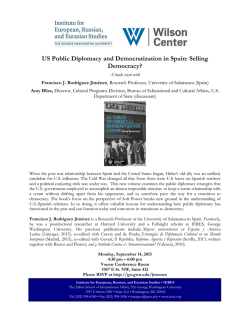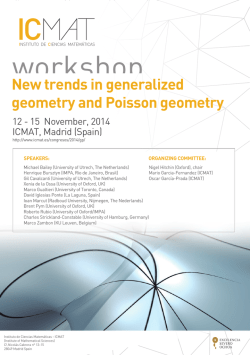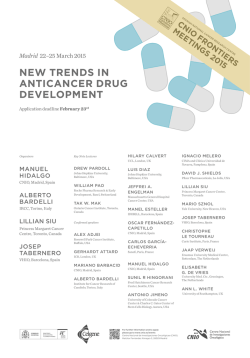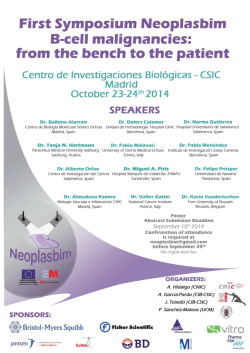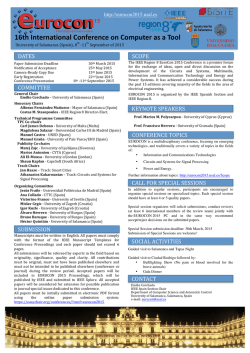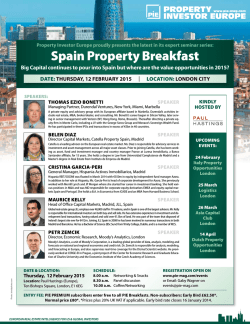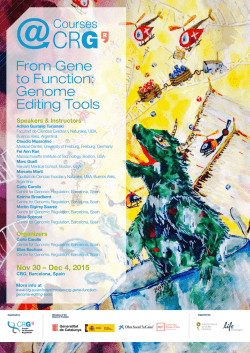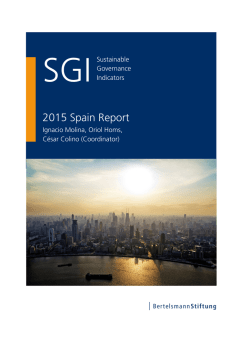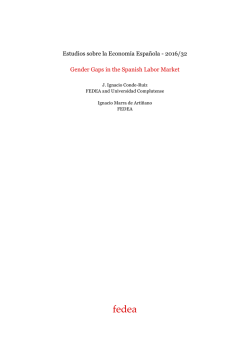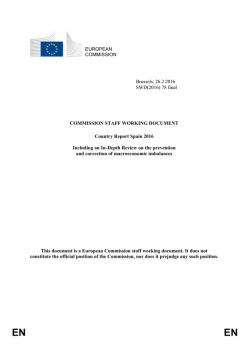
mercedes garcia-arenal - Consejo Superior de Investigaciones
The James K. Binder Lectureship in Literature Presents Mercedes Garcia-Arenal Is Arabic a Spanish Language? The Uses of Arabic in Early Modern Spain Starting in the 16th century, a new interest in Oriental languages arose in Europe, and in particular an interest in Arabic. This interest in Arabic stemmed from the textual study of the Bible which so absorbed European scholars in the age of the Reformation and Counter-Reformation. This is, then, an early "Orientalism" that has little to do with colonial enterprises, and follows different paths than those outlined by Edward Said in his famous book Orientalism. It has traditionally been argued that Spain played no part in forming this Orientalist knowledge. In fact, from its European contemporaries of the 16th century down to the historiography of the 20th century, Spain was essentially held to be an Oriental country itself, and therefore more of an object of "Orientalism" than an actual producer of Orientalist learning. This paper focuses on these two assumptions by examining the situation of the study of Arabic in Spain, and showing how in Spain Arabic scholars were immersed in a very specific context and in an ideological debate in which the role of the Arabic language was a crucial one. Throughout the 16th century there were significant populations of Arabic speakers living in Spanish territory. Spain's relationship with these minorities, known as Moriscos or converted Muslims, was highly conflictive, and eventually lead to an identification of Arabic with Islam. The central aim of this paper is to examine the complexity of the relationship between early modern Spain and the Arabic language, including the language's ambiguous standing, the need to deIslamize it, and the different purposes for which it was employed. In particular, this talk will highlight the tension between impure origins (those of the converts from Judaism and Islam) versus sacred origins, and the efforts that were made to write an account of the sacred origins of Spain that would allow Jews and Muslims to be incorporated into the nation’s past. Prof. Mercedes García-Arenal: Research professor at the Centro de Ciencias Humanas y Sociales, CSIC, Madrid. (Consejo Superior de Investigaciones Cientificas, Spanish Council for Scientific Research). She is a cultural historian of the Early Modern Muslim West (Islam in the Iberian Peninsula and the Maghreb), she has published extensively on religious minorities: mudejars and moriscos in Christian Spain, and Jews in Islamic lands, and dedicated much attention to processes of conversion, of messianism and millenarianism, to the study of saints and mysticism. She focuses on interreligious relations, cultural transmission, forced conversion and its consequences both for minorities and for mainstream society in Iberia. Her best known book is the one written with Gerard Wiegers, A Man of Three Worlds. Samuel Pallache, a Moroccan Jew between Catholic and Protestant Europe, first published in Spanish (Johns Hopkins University Press in 2003), and also translated into Arabic, Italian and Dutch. Thursday, April 16, 2015 6:00pm The Atkinson Pavilion at the Faculty Club UC San Diego A reception will follow the lecture The James K. Binder Lectureship in Literature is made possible by Mr. Binder’s generous bequest and honors his wishes that we bring leading European intellectuals to UC San Diego to provide a forum for rigorous discussions of literary topics. Contact Samantha Barlow for reasonable accommodations to enable your access and participation– [email protected] Night parking permits may be purchased for $4.00 at vending stations (exact change or credit card). A few parking spaces may be available in lot P-206 outside the Faculty Club; Lots P-207 and P-208 can be accessed from Muir College Drive off Torrey Pines Road. Please see campus maps at http://maps.ucsd.edu or http://yamhill.ucsd.edu/tps/pdfs/PayStationMap.pdf for pay stations.
© Copyright 2026
